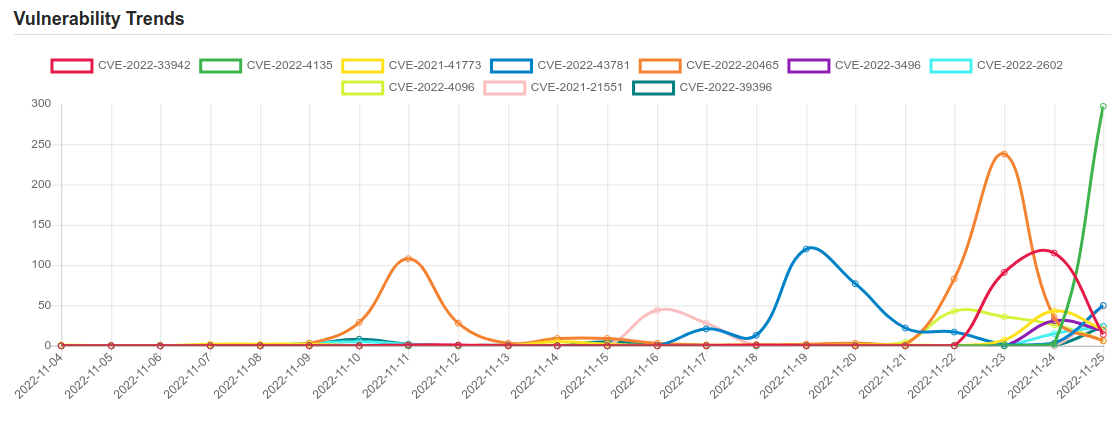Daily Vulnerability Trends: Sat Nov 26 2022

| CVE NAME | CVE Description |
| CVE-2022-3602 | A buffer overrun can be triggered in X.509 certificate verification, specifically in name constraint checking. Note that this occurs after certificate chain signature verification and requires either a CA to have signed the malicious certificate or for the application to continue certificate verification despite failure to construct a path to a trusted issuer. An attacker can craft a malicious email address to overflow four attacker-controlled bytes on the stack. This buffer overflow could result in a crash (causing a denial of service) or potentially remote code execution. Many platforms implement stack overflow protections which would mitigate against the risk of remote code execution. The risk may be further mitigated based on stack layout for any given platform/compiler. Pre-announcements of CVE-2022-3602 described this issue as CRITICAL. Further analysis based on some of the mitigating factors described above have led this to be downgraded to HIGH. Users are still encouraged to upgrade to a new version as soon as possible. In a TLS client, this can be triggered by connecting to a malicious server. In a TLS server, this can be triggered if the server requests client authentication and a malicious client connects. Fixed in OpenSSL 3.0.7 (Affected 3.0.0,3.0.1,3.0.2,3.0.3,3.0.4,3.0.5,3.0.6). |
| CVE-2022-33679 | Windows Kerberos Elevation of Privilege Vulnerability. This CVE ID is unique from CVE-2022-33647. |
| CVE-2018-8174 | A remote code execution vulnerability exists in the way that the VBScript engine handles objects in memory, aka “Windows VBScript Engine Remote Code Execution Vulnerability.” This affects Windows 7, Windows Server 2012 R2, Windows RT 8.1, Windows Server 2008, Windows Server 2012, Windows 8.1, Windows Server 2016, Windows Server 2008 R2, Windows 10, Windows 10 Servers. |
| CVE-2022-2650 | Improper Restriction of Excessive Authentication Attempts in GitHub repository wger-project/wger prior to 2.2. |
| CVE-2021-33621 | The cgi gem before 0.1.0.2, 0.2.x before 0.2.2, and 0.3.x before 0.3.5 for Ruby allows HTTP response splitting. This is relevant to applications that use untrusted user input either to generate an HTTP response or to create a CGI::Cookie object. |
| CVE-2022-3199 | Use after free in Frames in Google Chrome prior to 105.0.5195.125 allowed a remote attacker to potentially exploit heap corruption via a crafted HTML page. (Chromium security severity: High) |
| CVE-2022-33942 | Protection mechanism failure in the Intel(R) DCM software before version 5.0 may allow an unauthenticated user to potentially enable escalation of privilege via adjacent access. |
| CVE-2022-4135 | Heap buffer overflow in GPU in Google Chrome prior to 107.0.5304.121 allowed a remote attacker who had compromised the renderer process to potentially perform a sandbox escape via a crafted HTML page. (Chromium security severity: High) |
| CVE-2021-41773 | A flaw was found in a change made to path normalization in Apache HTTP Server 2.4.49. An attacker could use a path traversal attack to map URLs to files outside the directories configured by Alias-like directives. If files outside of these directories are not protected by the usual default configuration “require all denied”, these requests can succeed. If CGI scripts are also enabled for these aliased pathes, this could allow for remote code execution. This issue is known to be exploited in the wild. This issue only affects Apache 2.4.49 and not earlier versions. The fix in Apache HTTP Server 2.4.50 was found to be incomplete, see CVE-2021-42013. |
| CVE-2022-43781 | There is a command injection vulnerability using environment variables in Bitbucket Server and Data Center. An attacker with permission to control their username can exploit this issue to execute arbitrary code on the system. This vulnerability can be unauthenticated if the Bitbucket Server and Data Center instance has enabled “Allow public signup”. |
| CVE-2022-20465 | In dismiss and related functions of KeyguardHostViewController.java and related files, there is a possible lockscreen bypass due to a logic error in the code. This could lead to local escalation of privilege with no additional execution privileges needed. User interaction is not needed for exploitation.Product: AndroidVersions: Android-10 Android-11 Android-12 Android-12L Android-13Android ID: A-218500036 |
| CVE-2022-3496 | A vulnerability was found in SourceCodester Human Resource Management System 1.0 and classified as critical. This issue affects some unknown processing of the file employeeadd.php of the component Admin Panel. The manipulation leads to improper access controls. The attack may be initiated remotely. The identifier VDB-210785 was assigned to this vulnerability. |
| CVE-2022-2602 | No description provided |
| CVE-2022-4096 | Server-Side Request Forgery (SSRF) in GitHub repository appsmithorg/appsmith prior to 1.8.2. |
| CVE-2021-21551 | Dell dbutil_2_3.sys driver contains an insufficient access control vulnerability which may lead to escalation of privileges, denial of service, or information disclosure. Local authenticated user access is required. |
| CVE-2022-39396 | Parse Server is an open source backend that can be deployed to any infrastructure that can run Node.js. Versions prior to 4.10.18, and prior to 5.3.1 on the 5.X branch, are vulnerable to Remote Code Execution via prototype pollution. An attacker can use this prototype pollution sink to trigger a remote code execution through the MongoDB BSON parser. This issue is patched in version 5.3.1 and in 4.10.18. There are no known workarounds. |
| CVE-2022-40684 | An authentication bypass using an alternate path or channel [CWE-288] in Fortinet FortiOS version 7.2.0 through 7.2.1 and 7.0.0 through 7.0.6, FortiProxy version 7.2.0 and version 7.0.0 through 7.0.6 and FortiSwitchManager version 7.2.0 and 7.0.0 allows an unauthenticated atttacker to perform operations on the administrative interface via specially crafted HTTP or HTTPS requests. |
| CVE-2022-32898 | The issue was addressed with improved memory handling. This issue is fixed in iOS 15.7 and iPadOS 15.7, iOS 16, macOS Ventura 13, watchOS 9. An app may be able to execute arbitrary code with kernel privileges. |
| CVE-2022-38374 | A improper neutralization of input during web page generation (‘cross-site scripting’) in Fortinet FortiADC 7.0.0 – 7.0.2 and 6.2.0 – 6.2.4 allows an attacker to execute unauthorized code or commands via the URL and User fields observed in the traffic and event logviews. |
| CVE-2022-3910 | Use After Free vulnerability in Linux Kernel allows Privilege Escalation. An improper Update of Reference Count in io_uring leads to Use-After-Free and Local Privilege Escalation. When io_msg_ring was invoked with a fixed file, it called io_fput_file() which improperly decreased its reference count (leading to Use-After-Free and Local Privilege Escalation). Fixed files are permanently registered to the ring, and should not be put separately. We recommend upgrading past commit https://github.com/torvalds/linux/commit/fc7222c3a9f56271fba02aabbfbae999042f1679 https://github.com/torvalds/linux/commit/fc7222c3a9f56271fba02aabbfbae999042f1679 |
A considerable amount of time and effort goes into maintaining this website, creating backend automation and creating new features and content for you to make actionable intelligence decisions. Everyone that supports the site helps enable new functionality.
If you like the site, please support us on Patreon using the button below

To keep up to date follow us on the below channels.






![Cobalt Strike Beacon Detected - 196[.]251[.]84[.]126:7777 8 Cobalt-Strike](https://www.redpacketsecurity.com/wp-content/uploads/2021/11/Cobalt-Strike-300x201.jpg)